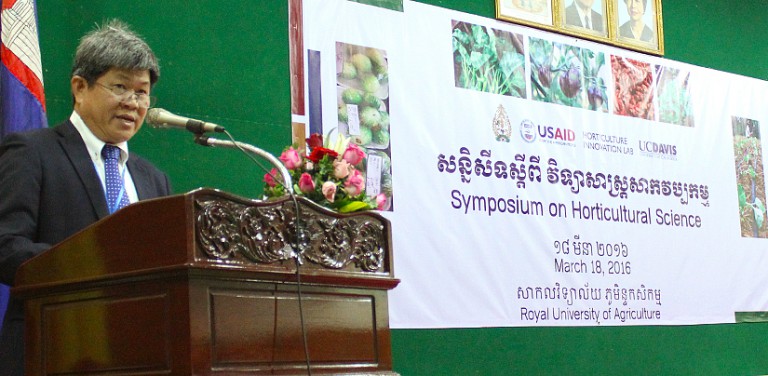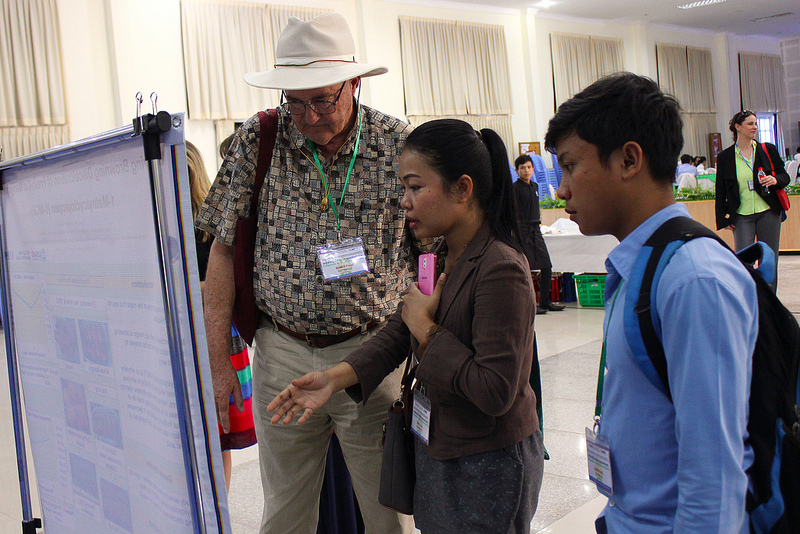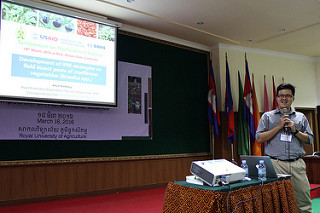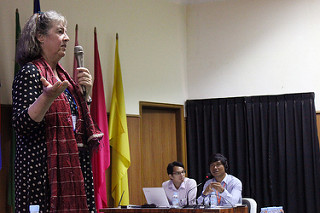
Approximately 175 participants attended a Symposium on Horticultural Science, held March 18 at the Royal University of Agriculture campus in Phnom Penh, Cambodia. The event was presented by the Royal University of Agriculture in collaboration with the Horticulture Innovation Lab.
The rector of the Royal University of Agriculture, Ngo Bunthan attended the technical sessions. He also offered welcoming remarks about the importance of horticulture in Cambodia and the increasing demand for Cambodian-grown fresh produce.
“The Royal Government of Cambodia has set a high priority on the agriculture sector for sustainable growth because of its leading contribution to the country’s economy,” Bunthan said. “More than 70 percent of the population work in rural cultivation. However, Cambodia’s horticulture [sector]… is not self-sufficient yet, and the country relies heavily on imports from neighboring countries.”
He also emphasized the university’s interest in international cooperation and building the capacity of its young lecturers, alumni and students.
“This symposium is important in developing the concrete understanding of horticulture technology among resources in the university, where those technologies can then be disseminated to the field and privates farms, ultimately producing sustainable horticulture products for Cambodia,” he said.

Between presentations, the event included a poster session where students, alumni and staff members shared their work with farmers, pest management practices, postharvest research, and agricultural technologies. Simultaneous translation in Khmer was provided during the meeting.
Researcher Borarin Buntong of the Royal University of Agriculture and his team successfully organized and hosted the event, with programmatic input and financial support from the Horticulture Innovation Lab.
Horticultural highlights from presentations

Khun Kimkhuy of the Royal University of Agriculture spoke about integrated pest management strategies for cruciferous vegetables. He explained that IPM practices are important because of widespread concerns in Cambodia about pesticide safety, with an example from 2015 farmer surveys that reported farmers on average spraying three times per week, with mixtures of 4-6 pesticides. Some of the practices he saw success with included using plastic barriers and planting green onions, basil or lemongrass to reduce certain pest populations.
Karen LeGrand, a UC Davis researcher who is currently based at the Royal University of Agriculture, spoke on the challenges of improving food safety related to farmer practices.
“The greatest challenge in food safety is: How do you get people to change their behavior, particularly when they don’t see the consequences?” she said, about farmers understanding the effects of their actions on consumer health.
Improving postharvest practices was the topic of a presentation from Beth Mitcham focused on preserving the quality of tropical fruits and another from Michael Reid focused on cooling. Reid stumped the audience with his classic quiz question, “What are the three most important factors affecting postharvest losses of perishable crops?” (Hint: It’s a trick question.) Correct answer: Temperature, temperature, and temperature.
Ramu Govindasamy of Rutgers, the State University of New Jersey, presented on organic marketing trends for fresh produce around the world, including what data he could find about the organic market in Cambodia.

Kate Scow of UC Davis spoke on soil biology, particularly ways that agricultural management practices can better support soil microbes and the benefits of soil biodiversity. As part of her presentation, she discussed the soil management philosophy of a California farmer named Scott Park (find the video here).
Mark Bell of UC Davis gave a talk about three things to know about improving extension to farmers with the acronym AID (Aware, Interest, Doable). Johan Van Asbrouck of Rhino Research gave a brief presentation about the importance of drying for seed storage and zeolite-based drying beads.
Jun Acedo of AVRDC – The World Vegetable Center presented an overview of his career as a postharvest scientist, and Walter Bowen of the University of Florida shared concepts and experiences from a tri-lateral international project.
More:
